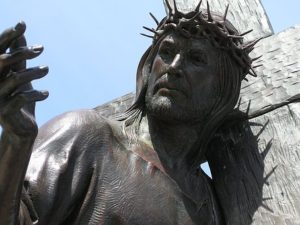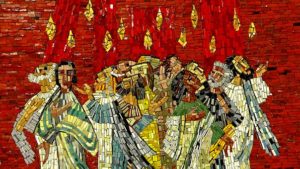ATONEMENT ?
In traditional Christian terms, atonement is the reconciliation of God and humankind through the sacrificial death of Jesus Christ (usually perceived as needed because… due to Adam & Eve’s sin, mankind was forced out of Heaven).

But Atonement in A Course in Miracles (ACIM) is something totally different. Atonement in the Course is ‘waking up’ and realizing that sin (separation from God) couldn’t happen, and never happened, and God’s Son never separated from His Father.
Early on in the ACIM Text, Atonement is first mentioned and described in Chap. One Sec. I, in the fifty Miracle Principles (#25, 26, 33, 34, 37, 44).
Jesus says this in principle #25… Miracles are part of an interlocking chain of forgiveness which, when completed, is the Atonement. (Text, p.4) Forgiveness in the Course is always referred to as an opportunity to let go of our belief that someone is guilty or sinful, including ourselves.
Jesus then goes on to talk about and use the word Atonement more than 250 times in the Course.
Ken Wapnick, in his Glossary-Index for ACIM, calls the Atonement… the Holy Spirit’s plan of correction to undo the ego and heal the belief in separation. It came into being after the seeming separation, and will be completed when every separated Son has fulfilled his part in the Atonement by total forgiveness. Its principle is that the separation never occurred.
Emphasis then is on the last sentence. Since the separation from God never happened, the Atonement becomes a series of wake-up experiences (the Course calls them miracles) to the inevitable understanding that this is true. We never disconnected from our Father in Heaven or separated from each other. The tiny mad idea of separation was just that… It was tiny and made-up, not to mention crazy, but ultimately just silly.
Another way of defining Atonement is that ‘nothing happened,’ i.e. there was no separation. Jesus uses that phrase a number of times throughout the Course:
—————-
Nothing happened!

“Nothing unreal exists.” (Text Intro, p.1)
11 “The ego can accept the idea that return is necessary because it can so easily make the idea seem difficult. Yet the Holy Spirit tells you that even return is unnecessary, because what never happened cannot be difficult. However, you can make the idea of return both necessary and difficult. ” (Ch. 6, sec II, par.11. p.98)
“Such evident inconsistencies account for why no one has really explained what happens in psychotherapy. Nothing really does. Nothing real has happened to the unhealed healer, and he must learn from his own teaching. His ego will always seek to get something from the situation.” (Ch.9, sec V, par.5, p.172)
“… recognize that what has no effects does not exist. Laws do not operate in a vacuum, and what leads to nothing has not happened. If reality is recognized by its extension, what leads to nothing could not be real.” (Ch.11, sec V, par.2, p.203)
“For if you accept your invulnerability, you are recognizing that attack has no effect. Although you have attacked yourself, you will be demonstrating that nothing really happened. Therefore, by attacking you have not done anything. Once you realize this you will no longer see any sense in attack, for it manifestly does not work and cannot protect you.” (Ch. 12, sec V, par. 2, p.203)
4 “Nothing at all has happened but that you have put yourself to sleep, and dreamed a dream in which you were an alien to yourself, and but a part of someone else’s dream. The miracle does not awaken you, but merely shows you who the dreamer is… The miracle does nothing but to show him that he has done nothing. What he fears is cause without the consequences that would make it cause. And so it never was.” (Ch.28, sec II, par. 4 & 7, p.593-594)
1 Today we will anticipate the time when dreams of sin and guilt are gone, and we have reached the holy peace we never left. Merely a tiny instant has elapsed between eternity and timelessness. So brief the interval there was no lapse in continuity, nor break in thoughts which are forever unified as one. Nothing has ever happened to disturb the peace of God the Father and the Son. This we accept as wholly true today.” (Les. #234. p.409)
——————————
Jesus also repeatedly tell us…
The sole responsibility of the miracle worker is to accept the Atonement for himself. (Ch.2, sec V, par.5, p.25)
The teacher of God takes accepting the Atonement for himself as his only function. (Man. #22 par.1, p.55)

If thats true , then how do each of us go about accepting and implementing in our own lives this plan of Atonement? Two key elements of the process are pointed out here in sec IV of Ch.9… The first is our willingness to let go of our judgements of each other and ourselves, and the second is to ask the Holy Spirit for help to see beyond those judgements and have a different experience of all our brothers and ourselves…
The Holy Spirit’s (Atonement) Plan of Forgiveness…
in Chapter 9:
1 Atonement is for all, because it is the way to undo the belief that anything is for you alone. To forgive is to overlook. Look, then, beyond error (judgment and condemnation) and do not let your perception rest upon it, for you will believe what your perception holds (sees). Accept as true only what your brother is (a guiltless Son of God), if you would know yourself. Perceive what he is not (a sinner) and you cannot know what you are, because you see him falsely. Remember always that your (True) Identity is shared, and that Its sharing is Its reality.
2 You have a part to play in the Atonement, but the plan of the Atonement is beyond you. You do not understand how to overlook errors (your judgments), or you would not make them. It would merely be further error to believe either that you do not make them, or that you can correct them without a Guide to correction (Jesus or the Holy Spirit). And if you do not follow this Guide, your errors will not be corrected. The plan is not yours because of your limited ideas about what you are. This sense of limitation (the tiny mad idea of separation) is where all errors arise. The way to undo them, therefore, is not of you but for you. (sec IV of Ch.9, par.1-2, p.168)
—————————
Atonement in the Course is not the atonement definition for many new age thinkers, where atonement means at-one-ment. The Atonement in the Course however is a process of waking up. It is realizing that we can and will forgive our brothers and ourselves… not because our sins are real and need to be forgiven. But we begin to see and experience the unreality of those sins and let go of our need for retribution. (At-one-ment in the Course would be the experience of our Oneness in Heaven that is our True Identity… which is what we return to when we complete the Atonement process of forgiveness in the Course.)
This profound process of moving through the three steps of forgiveness outlined in the Course is the way to fulfill God’s Plan of Atonement in our lives. We atone for our own seeming sins and the sins of others, not through martyrdom or sacrifice, but by having the very real experience that all our innocence as One Son of God is still intact, no matter what we or others seem to have done… this is not a whitewashing of sins, but simply a realization that ‘nothing happened. Our true AT-ONE-MENT is still who and what we are in Heaven. Our ‘job,’ our only function, is to stop insisting that that is not our true reality…
Check out Lyn’s Video on
“Whispering to The Atonement”
https://www.youtube.com/watch?v=aRza8PlK4dc&t=15s
Ken Wapnick’s 5 min. description of “Atonement:”
Ken’s Seminar on “Atonement without Sacrifice:”
![Atonement without Sacrifice [MP3]](https://cdn.shopify.com/s/files/1/2062/0643/products/3-MP3_front_cover_MP3_480x480.jpg?v=1507925192)



